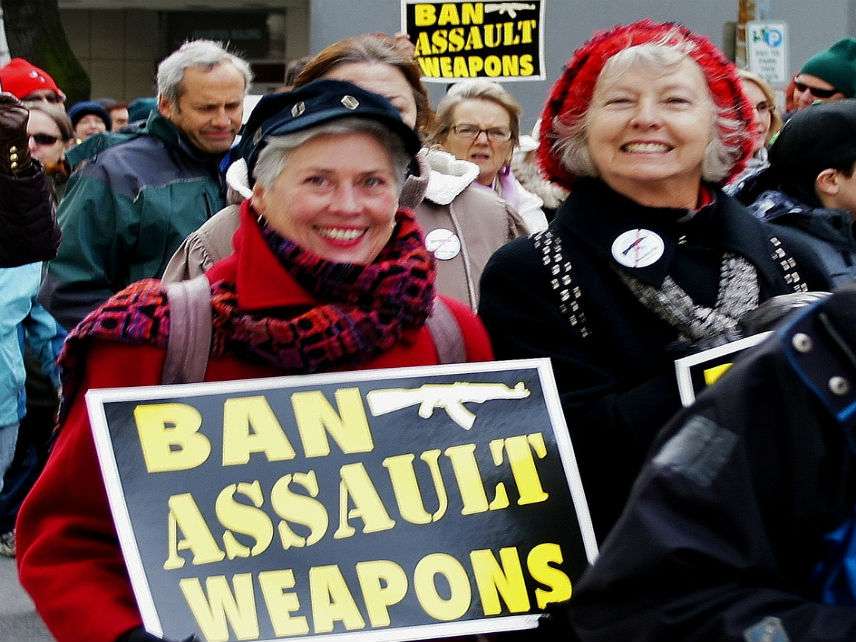Second Amendment Does Not Apply to 'Assault Weapons,' Says U.S. District Judge
His obsession with Justice Scalia's aside in Heller about "weapons...most useful in military service" ignores Scalia writing of weapons "typically possessed by law-abiding citizens for lawful purposes."
Relying on certain stated or implied limitations on the weapons to which the Second Amendment applied in Justice Antonin Scalia's opinion in D.C. v. Heller (2008), U.S. District Court Judge William G. Young this week granted summary judgment to Massachusetts in a lawsuit challenging a 1998 state law that emulated the federal government's 1994 ban on certain weapons it characterized as "assault weapons." The federal ban expired in 2004 but the Massachusetts version remained in effect.

In their original complaint, plaintiffs David Worman et al argued that a 1998 Massachusetts state law that banned certain types of semi-automatic rifles and certain sized magazines violated their Second Amendment rights (and that a later attempt to apply the ban to other weapons not specifically listed originally but now considered to be illegitimate "copies or duplicates" constituted a 14th Amendment violation of due process)
In his decision in Worman v. Baker, Judge Young declared that "assault weapons and LCMs [large capacity magazines] are not within the scope of the personal right to 'bear arms' under the Second Amendment."
Why does Young think this? Because Scalia said in Heller that some weapons of primarily military use would not necessarily be covered by the Second Amendment ("weapons that are most useful in military service—M-16 rifles and the like—may be banned…"). Young believes that qualities of the weapons and magazines covered by the challenged law mark them as of primarily military use.
That phrase in Heller that Young relies on so much, echoing the 4th Circuit's Kolbe decision, may not bear as much weight as he thinks. The context makes it clear that Scalia is discussing what he considers "dangerous and unusual weapons" and the M16, which he names specifically in the next paragraph after mentioning "dangerous and unusual weapons," unlike civilian "assault weapons," in some varieties has a full-automatic firing mode.
Scalia was making an aside and not breaking down analytically the specific qualities of weapons he meant to mark as bannable. That's not the strongest phrase on which to lay the weight of an assault weapon ban, to my read. By no means can the weapons at issue in the Massachusetts ban be considered "dangerous and unusual."
Young grants that "assault weapons" under the Massachusetts regulations certainly are commonly used in America; nonetheless, such "present day popularity is not constitutionally material." Young holds hold tight to Scalia's aside about how "M-16 rifles and the like" that are "most useful in military service" may presumably be banned. He holds so tight to that phrase that he grossly misrepresents that aside of Scalia's as representing "the words of our constitution" which are "not mutable."
What he's really relying on is by no means "the words of our constitution" but an interpretation, a questionable one I'd say, of Scalia attempting to not be overly disruptive of already existing gun bans while thinking through Heller. (Besides, "assault weapons" were not at issue in the specific facts Scalia had to consider in Heller, involving D.C.'s complete ban on any readily usable weapon for self-defense in the home.)
Scalia wrote elsewhere in Heller, while attempting to reconcile his opinion with the 1939 Miller precedent, that "We therefore read Miller to say only that the Second Amendment does not protect those weapons not typically possessed by law-abiding citizens for lawful purposes, such as short-barreled shotguns. That accords with the historical understanding of the scope of the right."
That statement—though no more "the words of our constitution" than Scalia's aside about the ability to ban guns "most useful in military service"—gives weight to the plaintiffs' belief that a weapon like the AR-15, for example, which is very much "typically possessed by law-abiding citizens for lawful purpose" and is not in weapon terms especially "dangerous and unusual" should be protected, despite Judge Young's interpretation.
Young's attitude toward the Heller decision and so-called "assault weapons" has been shared by other courts in the past, including the 4th Circuit Court of Appeals the 2nd Circuit, and the 7th Circuit, though other lower court judges have disagreed. It is an issue that should be eventually considered by the Supreme Court. However, up until now, the Supreme Court has continued to avoid cases that would require them to decide whether certain rifles classified by certain states as "assault weapons" require Second Amendment protection.


Show Comments (298)